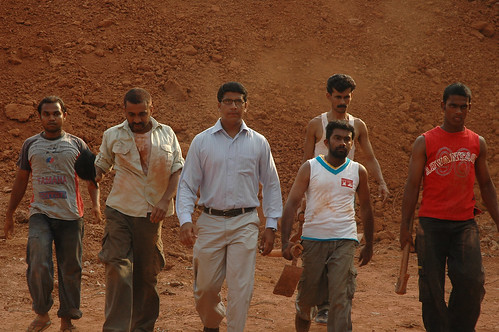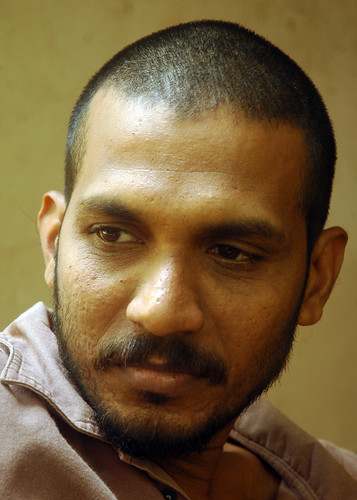By Shameer KS,
The camera pans wherever that cat trudges along. It is the story of that cat that ‘Peace Process’ narrates. But the peace here does not mean what it does in our dictionaries. And for the people to whom that cat belongs, it’s no longer a cat. In the process of Harshad’s camera narrating the story, the people also metamorphose. This metamorphosis of appearances is amplified by an eagle which circles around. No, it’s not an eagle either. You should judge it by the boom of a warplane which is its background sound.
The storyline is simple. A cat transfigured into a tiger in the imagination of some youths working in a quarry. It was unbelievable. But a vet who is an expert on wild animals confirmed their doubt. It took hardly a long time for all and sundry to jump into the bandwagon. The battle lines were drawn. Her ‘saviour’, who has been introduced as the hero, took the cat close to him and murmured into her ears: ‘You have the innocent smell of a little boy. But that smell is a frightening odour for all others. Their nightmares have taken the shape of a tiger. And for them your paws are the deadly paws of a tiger. They are selfish. And I saw the seed of hatred in them.’
The force of those bloodcurdling youngsters marched along. Around the cat it was choreographed into a frightening move of death…

A still from Peace Process
‘Peace Process’ is an allegory. Because it has employed the structure and language of absurd theatre, it craftily distances us from the frame. And, we can’t help getting reminded of those political narratives: War on terror, axis of evil, weapons of mass destruction and what else.
The frame of Yellow Glass, allegorical though, is different. It does not distance us. Like all of us, Dineshan, the protagonist, is not apparently absurd. He is a pharmacist, earns money if not so much and is living in our next door. So with him we can all identify.
Despite his profession, Dineshan is a non-conformist. To cure his sneezing, his wife complains, he does not take some medicine home; but rather burns camphor on a teaspoon and smells it. He even advises customers who are in a queue to buy eye drops not to use drops and glasses but merely to rinse their eyes with water.
A pandemic spreads all in a sudden. People began complaining of pain and irritation in their eyes. Water wells up in the eyes abnormally. Dineshan’s store began swarming with people. His colleague says eye drops are sold like hot cake. This ends in the intervention of the government. It brings about the rule of yellow glasses to be worn by all people in the area. Yellow glasses pass on as parts and parcels of daily life and become a shared belief. With some deft interconnected shots, Harshad shows us how the crowd behaves when it is in the frenzy of a shared belief. Dineshan, since it’s an issue related to drug administration, hesitates to join the crowd. Among those who wear yellow glasses, he instantly becomes a freak. But the people are not ready to spare the odd one out. They attack him with stones. And we see Dineshan in two ambiances: Dineshan wearing yellow glass is among his friends and Dineshan standing on a beach tosses the yellow glass into the roaring sea. The yellow glass never falls in the sea. It rests cosily in his hands. And Dineshan goes back to the crowd.
Compared to Peace Process, Yellow Glass does not drag us directly to the allegory. In the former, the contrast between the title (Peace) and its theme (organised violence) gives us hint about an implied political reference. In the latter, the title of the movie itself is a character and with the exception of some deft camera manoeuvrings, visuals obey the linear sequencing. But its political point is hard to miss.
Kerala brings out at least one movie director a month. With the complaint of frequent explosions at the box offices and the churning out of low commercial flicks, Malayalam movie industry is said to have landed in dire straits. Some promising movies that come out at times are also flown off unnoticed in this deluge of disappointment. Many filmmakers who had talent came and went. Therefore, someone who ventures into this uncertain ground of celluloid should be an experimentalist. That’s why Harshad, a young filmmaker based in Calicut, decided to plough a lonely furrow.
The idea of visualising a narrative in the canvas of a short film is challenging as well as effective in aspects such as cost and the management of time for pre and post production works. It is challenging in the sense that the director and editor will have to pack a story in the visuals which should not exceed the span of 20 minutes. What Edgar Allan Poe has said about writing a short story is relevant in this context. Since the aesthetic appeal of a short story on a reader is instant, if long-lasting, the pain a writer (in this case a director) has to take is too much.

Harshad
However, newcomers are not ready to experiment. It’s because they are all concerned about the consumption of the product. Mainstream audience whose presence in the theatre is gradually shrinking may discard it altogether. So someone who takes filmmaking as a profession to win bread may not put money in this genre.
Harshad, who is working as an artist in Calicut and for whom filmmaking is more a passion than a profession, finds in his niche audience the consumers of his film. There are peer reviewers as well. He focuses on expanding this circle to the maximum. The 36-year old is interested in using the expertise of new, innovative youths so that their camaraderie will help him decide the schedule of filming. He need not go after the date of an actor to fix the budget and timetable. For his short films, he hardly knocks at the door of famed names from the basics of script and casting to editing and dubbing. Dr Prasad, a homeopathic medical practitioner who regularly appears in the movie, has penned the script of Peace Process and there is an ensemble of such amateurs behind Harshad’s ventures.
There are two more movies in Harshad’s stable. But critics and his audience, who have received all his films well, give more marks to Peace Process and Yellow Glass. His Yellow Glass also got a special mention with certificate in the short-fiction category at the All Indian Short Film and Documentary Festival held recently in Thiruvananthapuram.

